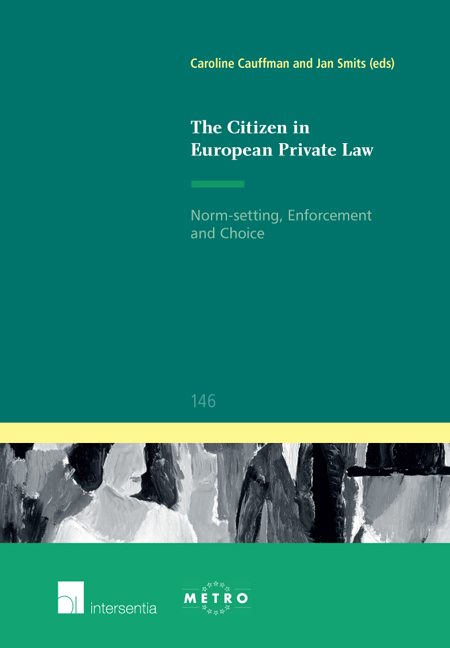Book contents
- Frontmatter
- Contents
- List of Authors
- List of Abbreviations
- Preface
- Introduction
- Part I Choice and Regulatory Competition
- Choice and Regulatory Competition. Rules on Choice of Law and Forum
- Party Autonomy in International Family Relationships: A Research Agenda
- Corporate Mobility in the European Union – A Flash in the Pan? An Empirical Study on the Success of Lawmaking and Regulatory Competition
- Corporate Mobility in the European Union – An Analysis of Ringe's Empirical Research on the Success of Law Making and Regulatory Competition
- Part II Norm-Setting and Enforcement
- Ius Commune Europaeum
Party Autonomy in International Family Relationships: A Research Agenda
from Part I - Choice and Regulatory Competition
Published online by Cambridge University Press: 21 September 2018
- Frontmatter
- Contents
- List of Authors
- List of Abbreviations
- Preface
- Introduction
- Part I Choice and Regulatory Competition
- Choice and Regulatory Competition. Rules on Choice of Law and Forum
- Party Autonomy in International Family Relationships: A Research Agenda
- Corporate Mobility in the European Union – A Flash in the Pan? An Empirical Study on the Success of Lawmaking and Regulatory Competition
- Corporate Mobility in the European Union – An Analysis of Ringe's Empirical Research on the Success of Law Making and Regulatory Competition
- Part II Norm-Setting and Enforcement
- Ius Commune Europaeum
Summary
In recent years, there has been quite a lively debate by citizens on the choice of legal regime. The debate has focused on concepts such as empowerment, enhancing participation of citizens in the European integration process and other items. For once, private international law may play a part in this discussion. The idea of choice by citizen indeed nicely fits in with one of the cornerstones of modern private international law, i.e. the concept of party autonomy. This mechanism is well known in the field of cross-border contracts. Parties to such contracts may select which law governs their contract, as has recently been confirmed by the Rome I Regulation, whose Preamble indicates that the parties’ freedom to choose the applicable law ‘should be one of the cornerstones of the system of conflict-of-law rules in matters of contractual obligations’. The nature, effects and consequences of such choice have been studied, against a background of intense debate on the legitimacy of allowing parties to choose the law applicable to their contract.
More recently, party autonomy has conquered new grounds in cross-border private relationships. Building on first attempts in national codifications, party autonomy has become one of the leading principles used in various EU regulations dealing with cross-border family relationships. It can now be found in successions, in divorce and in maintenance matters. It is widely expected that the future Regulation dealing with matrimonial property regimes will also allow parties to choose the applicable law. This new trend sometimes has been greeted with enthusiasm, sometimes with scepticism.
While these Regulations constrain the choice that parties can make, it cannot be denied that the principle of freedom of choice has been openly embraced by the European legislator. This principle evolved, at least within the EU, from what was until recently a marginal phenomenon to a well-respected solution for cross-border family relationships. This (r-)evolution occurred quite fast and has attracted much attention. However, much of the research in this area has adopted a limited perspective, focusing exclusively on the possibilities and limits of choice in one specific instrument or adopting a comprehensive outlook but with a strong positive flavour. While it is true that a number of contributions provide excellent food for thought, the overall impression is that more time and more research is needed to start apprehending the fundamental questions raised by this evolution.
- Type
- Chapter
- Information
- The Citizen in European Private LawNorm-Setting, Enforcement and Choice, pp. 23 - 48Publisher: IntersentiaPrint publication year: 2016



